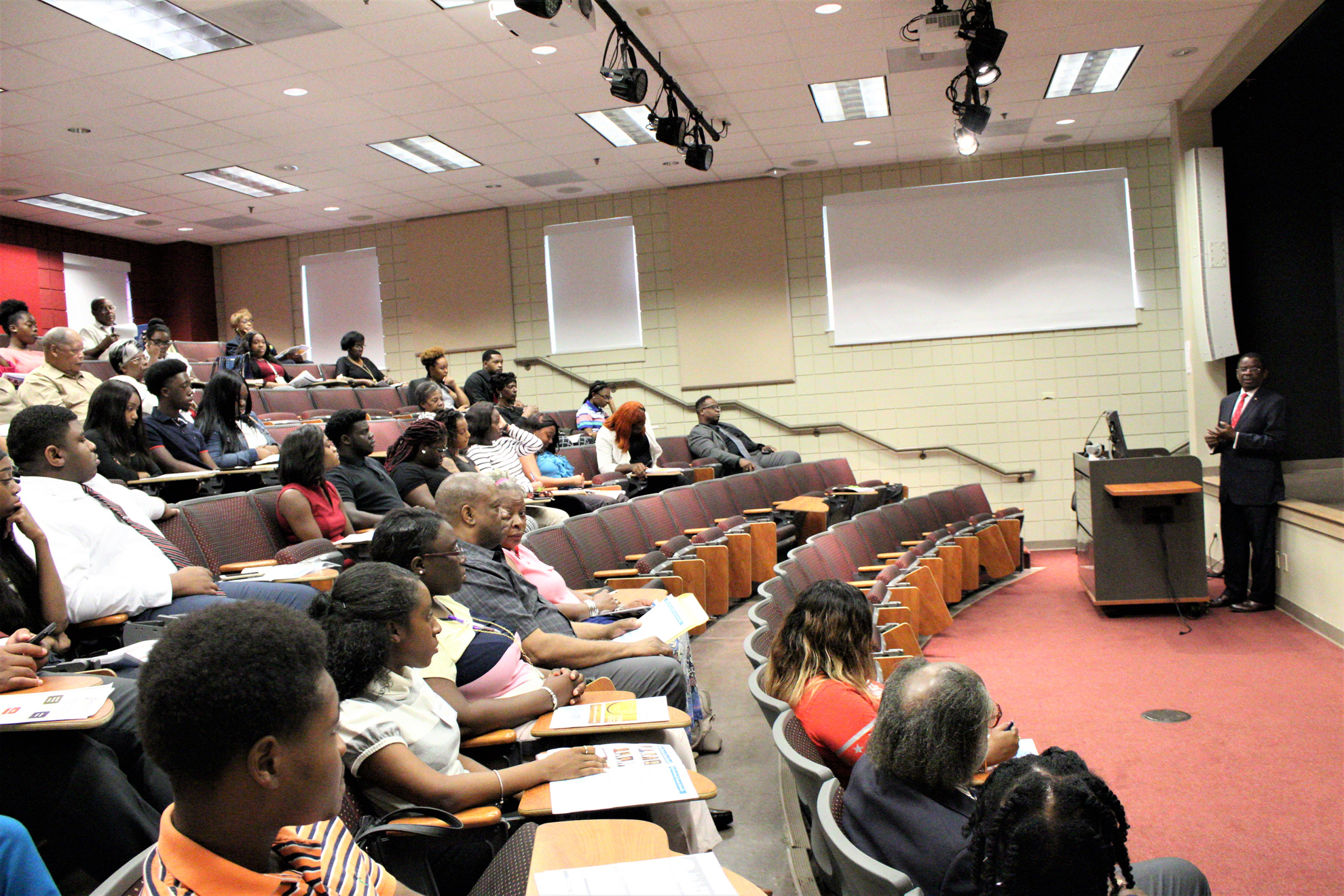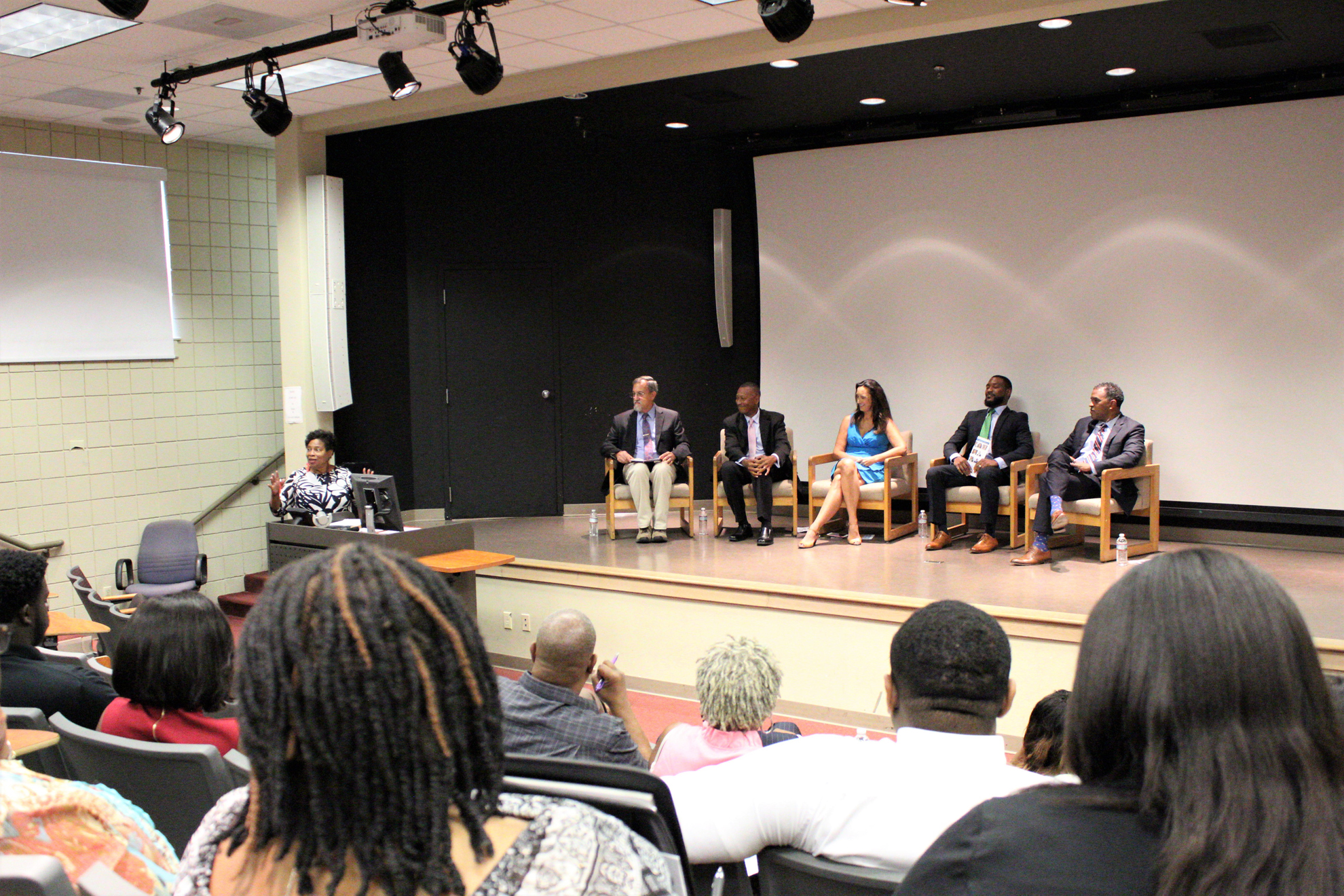Closing the educational gap: NAACP summit puts focus on building economic success
By: OLANMA HAZEL MANG
Oct 08, 2018

Claflin President Dr. Henry N. Tisdale addresses the NAACP Economic Summit. (Panther photo by Olanma Hazel Mang)
Federal regulations make it difficult to close the educational gap in the African-American community, Claflin University’s president said at the 2018 NAACP Economic Summit on Sept. 29.
The summit, titled “Linking Generations for Economic Sustainability,” focused on education and entrepreneurship in the African-American community. It was held at Claflin University.
Claflin President Henry N. Tisdale said one of the main issues the black community faces is access to affordable tertiary education.
“HBCUs serve a large percentage of low-income, first-generation students, students who need the Pell grant,” Tisdale said. “One of the things that the federal government can do, I believe, is to give more financial aid support to the students we serve.”
President Donald Trump’s proposed budget for the 2018 fiscal year included a $3.9 billion cut from the Pell Grant and a $9.2 billion cut from the U.S. Department of Education.
According to a 2017 statement by the United Negro College Fund, a philanthropic organization that funds scholarships for black students in America, about 70 percent of students attending HBCUs receive Pell Grants.
Tisdale said the budget, as well as the poor infrastructure issues that historically black colleges and universities have, make competition with predominantly white institutions very tough.
“The federal government can do more to make certain that our campuses are modern, our technology is cutting edge and that we have a climate that can be supportive of academic excellence for all the students who attend our institutions,” Tisdale said.
He also cited a study by the Frederick D. Research Institute, which stated that HBCUs had a $14.8 billion impact in America’s economy.
But despite their significance, HBCUs still struggle with enrollment, equality of education, leadership and financial health, Tisdale said.
“If we’re going to be competitive and survive in the future, we must do things differently,” he said. “We must put in place those building blocks to ensure the future.”
Nathaniel Spells Jr., chairman of the NAACP African-American Economic Summit, said the event intended to highlight the importance of education increasing the chances of successful entrepreneurship.
“We're trying to help them understand what the workforce is, that training is necessary to get the work and then when you get the job, how you can build wealth through financial literacy,” Spells said.
The summit included discussion segments on education, the workforce, financial literacy and entrepreneurship.
Cynthia Davis, director at the South Carolina Department of Commerce, said the landscape of the corporate world is quickly shifting into a digital era.
She was one of the panelists in the workforce segment titled “Current and Future Outlook for the SC Workforce.”
“You’re going to need some technical skills because these robots and kiosks are going to have to be fixed,” Davis said.
Diane Sumpter, president and CEO of DESA Inc., moderated the segment. She said constantly educating oneself is important in the evolving corporate world.
“Everything you’re doing today will need another way of doing it in a very short time,” she said.
In addition to formal education, interpersonal skills are also important, said panelist Darry Franco, the dean of aeronautical studies at Trident Technical College.
“The number one skillset they’re looking for is someone who wants to work, someone who has a good attitude, who wants to get up every day and report to work on time.” Franco said.
Walt Tobin Jr., president of Orangeburg-Calhoun Technical College, said young employees do not retain their jobs because of terrible soft skills.
Tobin, who was also a panelist, added that marijuana use is also a huge factor in low retention rates among young people. “It has some implications for them, I think, physically and emotionally, but also impacts their ability to get and retain a job.”
Panelists from the entrepreneurship segment said defining a target audience and paying attention to their demands are important in order to run a successful business.
“Know your niche,” Spells said. “Learn everything there is to know about it: target audience, what they want and how to appeal to them.”
Spells is also the owner of Construction Dynamics Inc., a construction management firm in Columbia.
Aaron Perry, Claflin University alumnus and CEO of Revolutionary Strength Technologies LLC, said it is critical to understand the legal process of owning a business.
The president of the South Carolina NAACP chapter, Brenda Murphy, said she hoped the summit made people aware of how they can affect the community’s economy.
The NAACP wants to teach its young black members leadership and communicative skills so they can interact with government officials, Murphy said.
“They should be able to learn how to negotiate for change,” she said. “They are our future leaders.”

The panel for the workforce segment at the 2018 NAACP African-American Economic Summit is, on stage, from left, Barry Franco, dean of aeronautical studies at Trident Technical College; Robert Crenshaw, area director and apprenticeship consultant for the S.C. technical college system; Cynthia Davis, program director at the S.C. Department of Commerce; Bryan Hemby, business solutions director at Midlands Technical College, and Walt Tobin Jr., president of Orangeburg-Calhoun Technical College. Moderator Diane Sumpter is at the podium. (Panther photo by Olanma Hazel Mang)